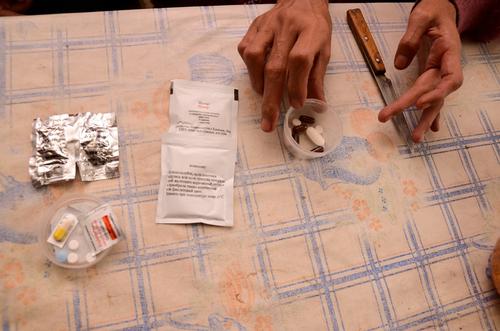A pioneering clinical trial aiming to find a radically improved course of treatment for drug-resistant tuberculosis (DR-TB) began on 17 January, when the first patient took the first pill in Uzbekistan.
The phase II/III trial, called TB PRACTECAL, aims to find a treatment regime for DR-TB that is drastically shorter, at six months long, more effective and has fewer debilitating side effects than current treatment.
The trial is run and sponsored by Médecins Sans Frontières (MSF) and is supported by the London School of Hygiene & Tropical Medicine as well as other leaders in medical research
It is a full phase III clinical trial combining two new anti-TB drugs (bedaquiline and pretomanid). This will maximise the potential of the trial to develop radically improved treatment for people with either multidrug-resistant TB and the even more resistant, extensively drug-resistant TB. The two new drugs will be given in combination with existing drugs for tackling DR-TB (linezolid, clofazimine and moxifloxacin).
Despite killing more people than HIV, TB is woefully underfunded. Medicines for TB have barely improved in the last 50 years. And the number of strains of TB resistant to current medicines is increasing at an alarming rate.
Currently patients with DR-TB are on medication for almost two years during which time they must swallow more than 10,000 pills and have painful daily injections for at least eight months. Side effects from treatment are often incapacitating, and include nausea, joint pains, psychosis and permanent deafness.
MSF has been calling on politicians, global health bodies and pharmaceutical companies to address this TB crisis, but in the face of insufficient movement has now decided to take action itself. MSF has played a catalytic role in providing TB and DR-TB care for 30 years and is now running two clinical trials. The other, endTB, is due to start in Georgia later this year.
The first patient on the TB PRACTECAL trial is based at the MSF-supported hospital in Karakalpakstan, in northwest Uzbekistan. They are the first of 630 patients to be recruited from Uzbekistan, Belarus and South Africa.
The trial will run in two stages. The first stage is a phase II trial finishing in 2018. It will test three different regimes containing new drugs, bedaquiline and pretomanid. The second stage is a phase III trial which will continue to test the two most successful regimes and will end in 2020.



